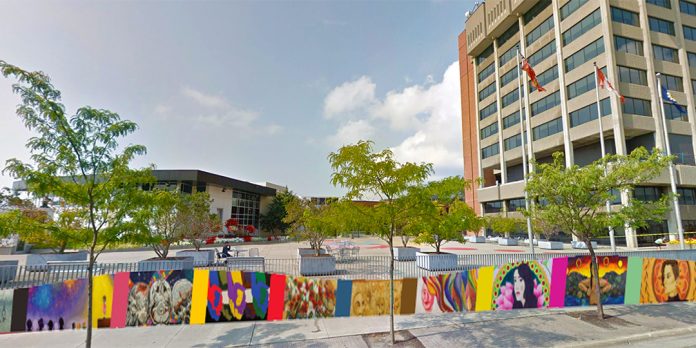“When I conceptualized the program, I thought the most important thing for fine artists was to learn how to become citizen artists,” said Greg Murphy, dean of the school of media art & design at Durham College.
“How do you use fine art to connect with your community, to advance the intentions of the good work being done by other groups who are also trying to grow the community, and can you use artistic skills to help them raise awareness, raise friends and contacts, and ultimately raise funds for their organizations,” he asked.
Each year since 2015, third-year fine arts students of the Media, Art & Design department at Durham College have teamed up with members of the Oshawa City Idea Lab as part of the public art community collaboration project.
This year’s theme focused on community diversity, equity and inclusion.
“The nice thing about this project is some students gravitated toward one part of the theme, others gravitated toward being inspired by all three,” said Dani Crosby, fine arts professor at Durham College. “It’s so, so open which is part of what makes it so challenging.”
Fine art students worked with members of the Community Diversity Equity and Inclusion Committee (C.D.E.I.C) of Oshawa to help hone their ideas.
Members of the committee come as advertised: individuals of the committee self-identify as Indigenous, Faith-based, LGBTQ2S, persons with disabilities, persons living in poverty, seniors, youth, women, people of diverse ethnic or cultural origin, and immigrants.
The committee, acting as advisors to the students, shared their stories and explained the importance of these art collaboration projects in a community.
Crosby said the project gives students the ability to select issues and subjects they feel are underrepresented in the community.
“It also gives the students the opportunity to create representation for people they care about and themselves,” she added.
The students presented their original ideas to the public art task force, but the group felt the theme of diversity, equity and inclusion was not fully met.
Murphy, who is also a part of the Cultural Leadership Council in Oshawa, spoke with the students of the program and assured them this was not an indictment of their work or talent, but rather, as it was, the task force could not endorse the work as representative of the people of Oshawa.
Murphy said it is a positive thing, as the college and city is maturing, they want the work that eventually makes it on display to be able to be vigorously defended as being representative of the people of Oshawa.
Rather than just coming up with an idea and putting it up, as perhaps was the case for past projects, the task force is beginning to put a filter on their decision-making process.
Students now have the option to simply submit their current works of art for grading, or rework their pieces into something the task force deems a suitable representation.
The location for the final designs that do meet approval has not been officially confirmed yet, but Kirsten Frankish, former supervisor of cultural development and programming at the city of Oshawa, said it is most likely they will be displayed within a city facility.
“The student’s artwork really helps in terms of telling the stories, number one, but also in terms of beautification and place making and really helping reflect the citizens of Oshawa,” said Frankish.
Along with providing the students a place to display their artwork around the city, the city helps with provision of supplies and installation charges of the student’s work.
“There’s a real sense of pride in terms of students’ work with the city and having their artwork showcased in quite a public manner,” said Frankish.
Frankish said the city tries to share the news of the students’ work through marketing, media releases and social media.
You may take a virtual tour of past students work at https://www.oshawa.ca/things-to-do/virtual-exhibitions.asp
The pieces that will eventually be installed at the undetermined location will be reproductions of the student’s art. This way the student, or rather artist, retains the original piece, along with full ownership of the art.
This practice also helps in the replacing of the artwork should the piece become damaged or need maintaining over time.
Although the collaboration project was not without its challenges this year, Murphy said these kind of experiential learning experiences should, and will continue.
“It’s a great partnership,” said Murphy, “You really want to take the kind of talent, and education and skills that you’ve acquired while you were at college and use it to contribute to the growth of the city, of your community.”




